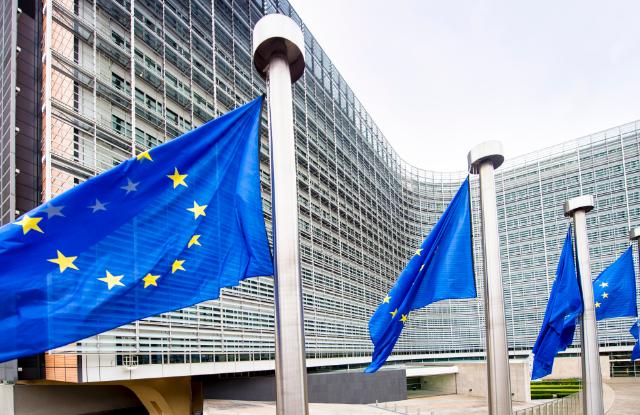A Special European Council will meet on Thursday afternoon to discuss European Defence and EU’s support for Ukraine in a tense and uncertain atmosphere.
In his invitation letter to the EU Member States, European Council President António Costa wrote that the aim is to follow-up on an informal leaders retreat a month ago “with a view to taking first decisions for the short-term, in order for Europe to become more sovereign, more capable and better equipped to deal with immediate and future challenges to its security”.
As far as Ukraine is concerned, there is a new momentum, according to the letter, which should lead to a comprehensive, just and lasting peace. Ukraine’s President Volodymyr Zelensky has been invited to come to Brussels to discuss the latest developments. As previously reported, EU – US relations has taken an ominous turn with the Trump administration announcing that it will pause military aid to Ukraine.
In a press briefing on Wednesday, a senior EU official referred to the invitation letter and described the context in which the Council meeting will take place. In a diplomatic understatement, he said that the EU has acknowledged “the change in the US position”.
For the time being, both the EU and Ukraine have been sidelined in the talks between the US and Russia. The talks could lead to a ceasefire followed by a peace settlement but this will not be discussed at the Council meeting because it would be premature, according to the EU official. He did not address the risk that the US will impose a peace settlement on Russia’s conditions.
What will be discussed at the Council meeting? In this new context, the EU must strengthen its military preparedness independently of the US and increase its support to Ukraine. The main topics at the Council meeting will be European defence and Ukraine, two closely interlinked issues.
There is a clear willingness to take the necessary action to increase EU military preparedness, according to the EU official. In what can be described as one of the most crucial Council meetings in decades, he struck a positive tone. “We expect the European Council to indicate how the EU should move forward and turn the page”.
The support to Ukraine can take different forms, including troops on the ground, but he focused on the defence package – ReArmEurope. The package was announced by European Commission President Ursula von der Leyen this week and could mobilize up to €800 billion in the coming years.
It is up to the Commission to explain the details of the package. He highlighted a new instrument that will provide € 150 billion of loans to Member States for investments in Europe’s defence industry and joint procurement of military equipment. It is a significant amount, compared for example to the size of Horizon Europe, EU's programme for research and innovation.
The Council is also expected to reinforce its previous messages on Ukraine. “The EU is there to strengthen Ukraine both immediately and in the future. We have already committed €30 billion for Ukraine in earmarked funding in 2025 and it’s possible to commit more on security guarantees.”
The issue of security guarantees for Ukraine is crucial because the Trump administration has announced that it will not provide such guarantees and also opposes NATO membership for Ukraine.
Directly after the meeting, on Friday morning, EU leaders will debrief non-EU countries that participated in the London summit about the Council conclusions.
It was not clear if the US will also be debriefed at this stage. Asked about an EU-US summit in the near future, the EU official replied that it could be useful and that the EU welcomes the idea, repeating that EU and US (still) are allies. He declined to comment on the current state of EU – US relations since the Trump administration entered into force.
“We’ll focus on what we need to do,” he said. “The EU needs to rely more on its own strength. We have the economic resources to increase our military capacity – that’s also part of our security guarantees for Ukraine. The context doesn’t change that.”
What about the “elephant in the room” – Hungary’s Prime Minister Viktor Orbán? In a letter to European Council President Costa, he wrote that there are “strategic differences in our approach to Ukraine”. He is convinced that the EU should follow the US and enter direct discussions with Russia on a ceasefire and sustainable peace in Ukraine.
“Any attempt to adopt written conclusions by the EU on Ukraine would project an image of a divided EU," he finished the letter, hinting that Hungary might veto such conclusions.
He also proposed to support the recent United Nations Security Council Conclusion (2774). The resolution, which was adopted with 10 votes in favour and 5 abstentions (Denmark, France, Greece, Slovenia, United Kingdom) is very brief and only states the following without mentioning that Russia launched a war of aggression against Ukraine:
“The Security Council, Mourning the tragic loss of life throughout the Russian Federation-Ukraine conflict, Reiterating that the principal purpose of the United Nations, as expressed in the Charter of the United Nations, is to maintain international peace and security and to peacefully settle disputes, Implores a swift end to the conflict and further urges a lasting peace between Ukraine and the Russian Federation.”
“We’ll try to have unity,” the EU official commented. Costas has read his letter and talked to Orbán but it was not clear if he managed to convince him not to veto the Council conclusions on Ukraine. The EU official expects that the European Council will be “extremely productive” and that the draft conclusions will not have to be redrafted.

